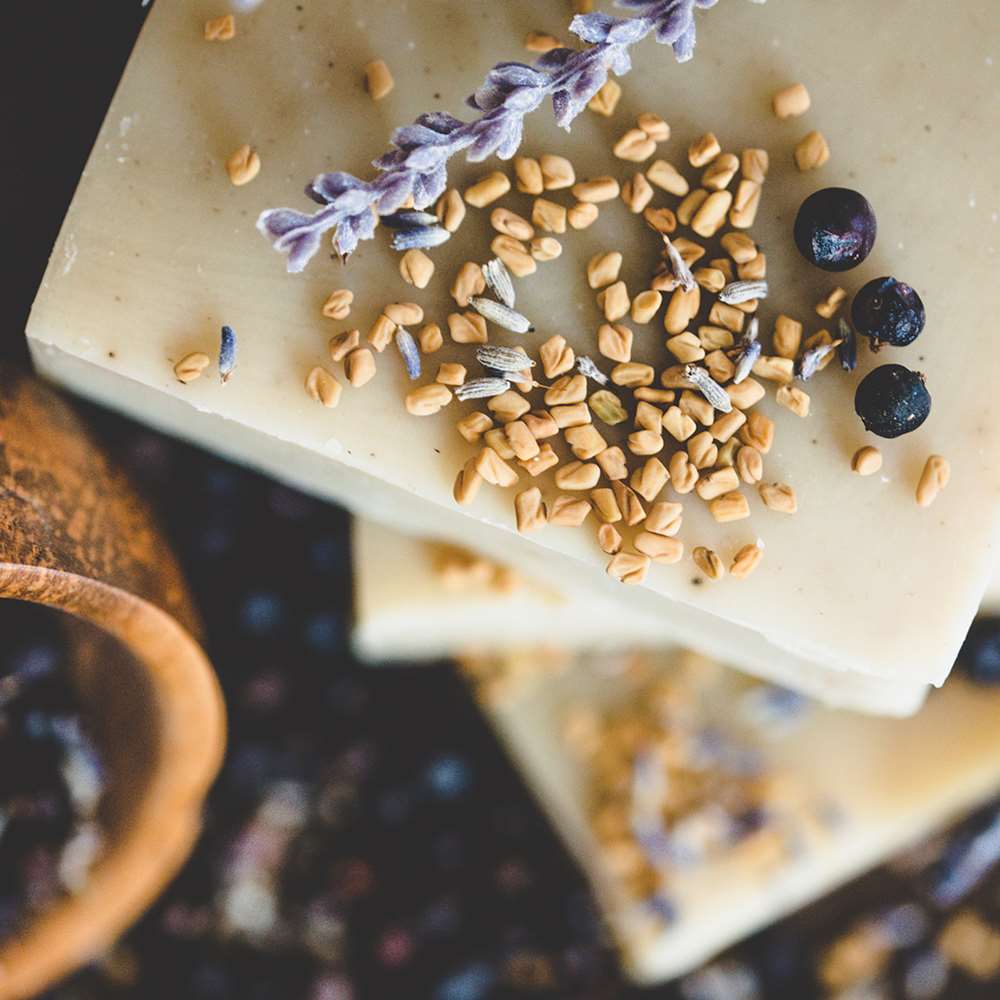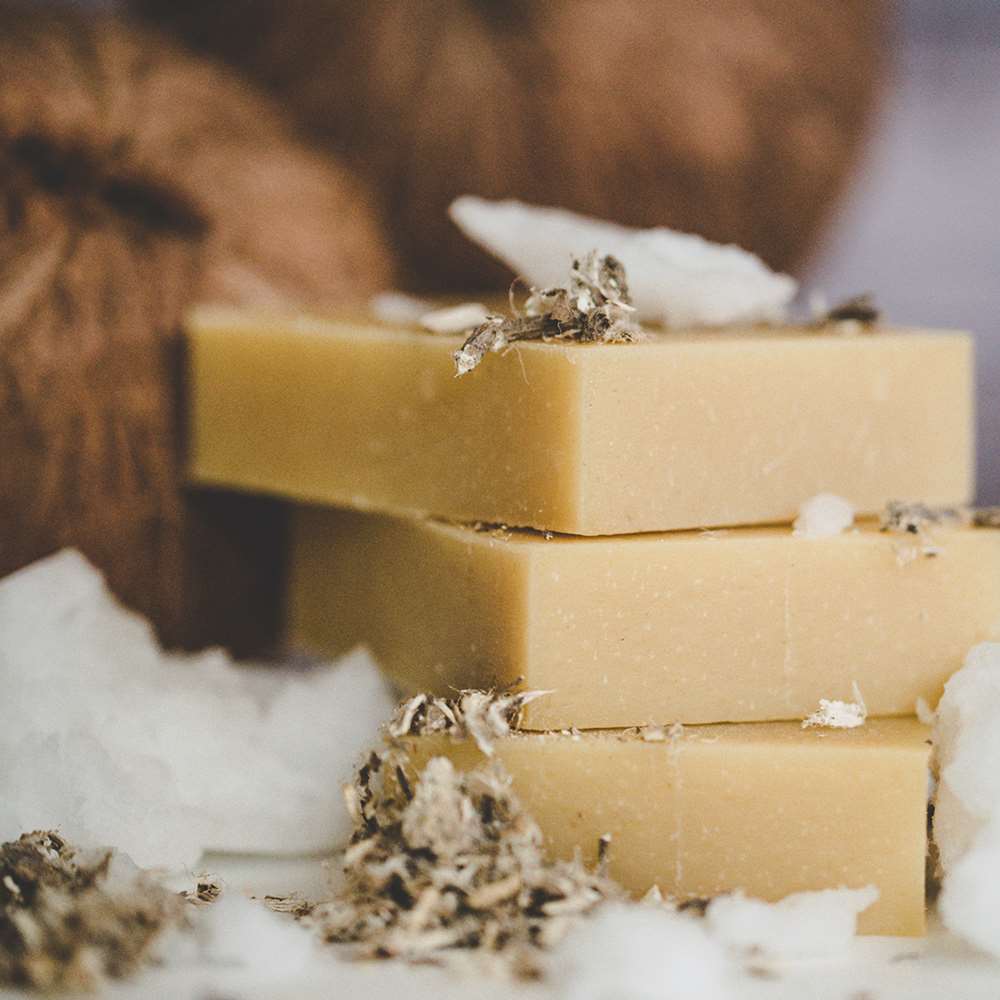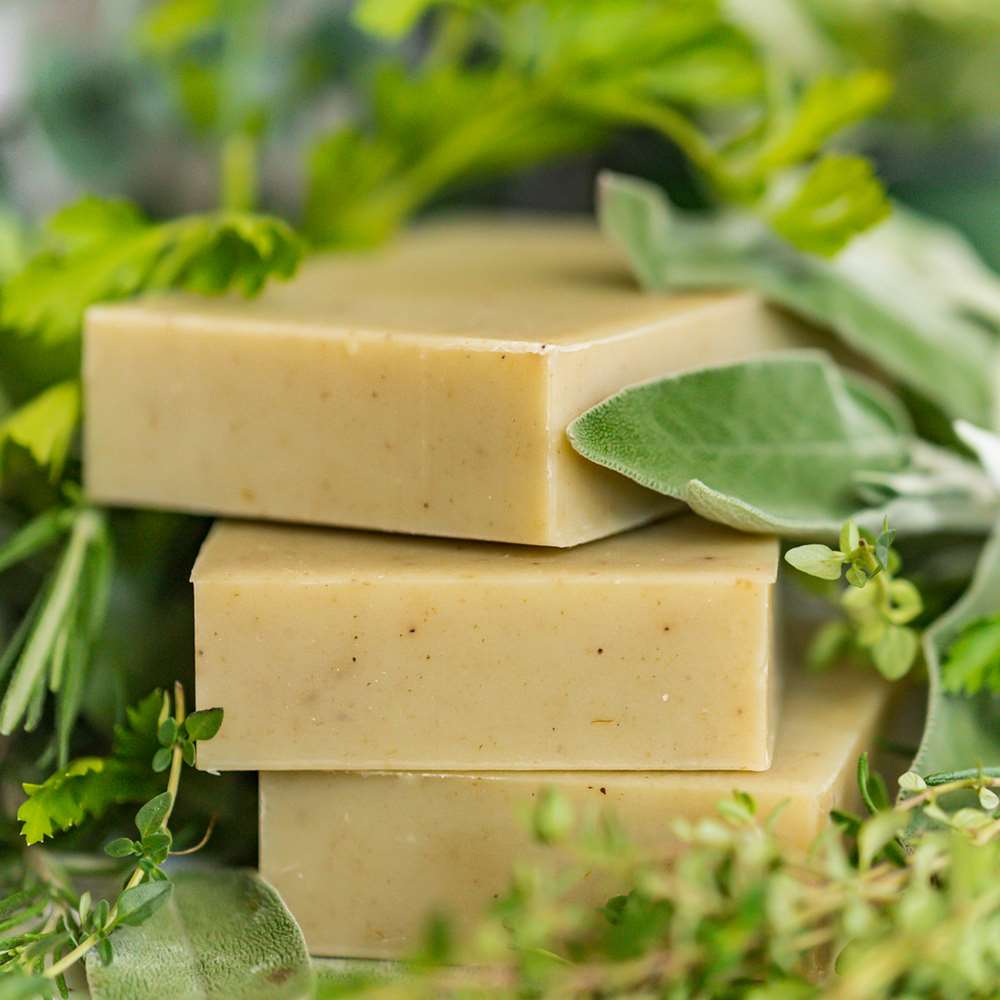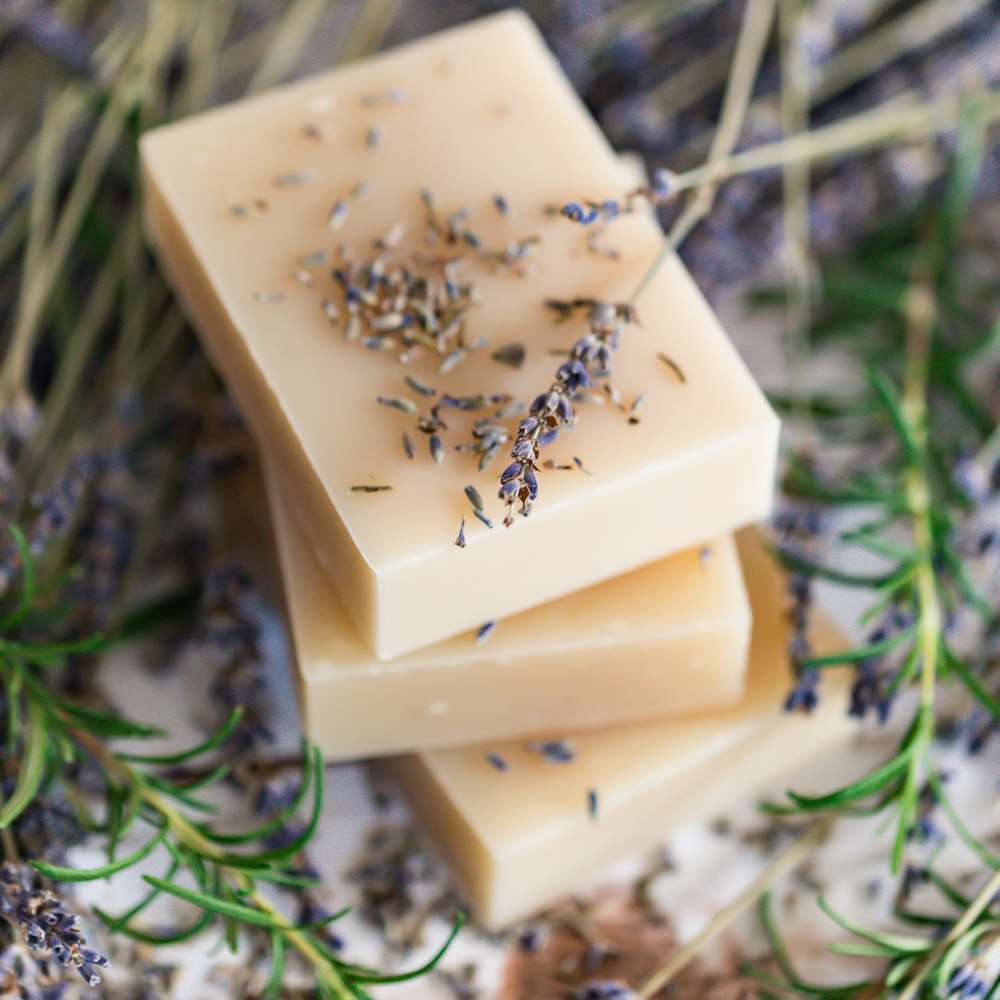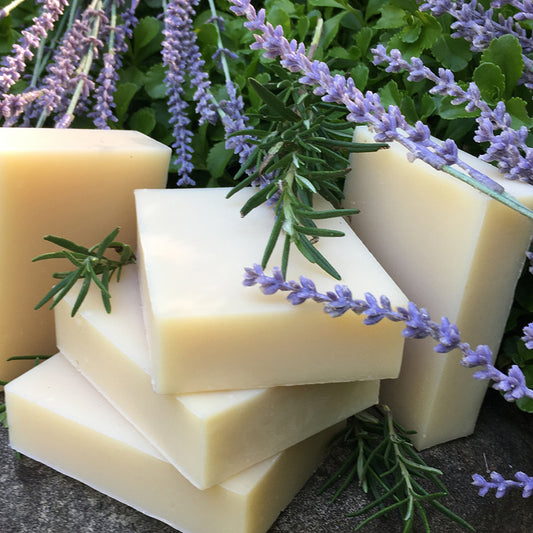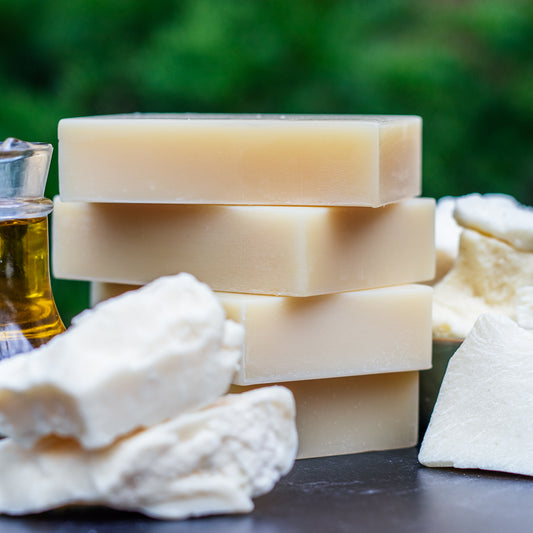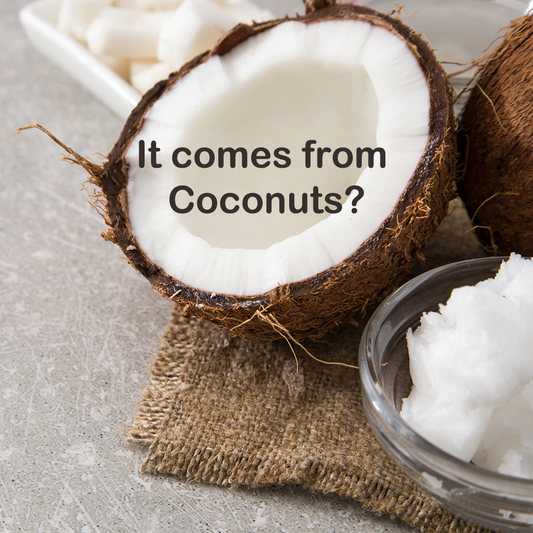Why Use A Natural Shampoo Bar?
Shampoo Bars Are Natural
Commercial shampoos are NOT.
 Our natural shampoo bars only contain the ingredients that they need—not the synthetic preservatives that liquid shampoos require for their shelf life.
Our natural shampoo bars only contain the ingredients that they need—not the synthetic preservatives that liquid shampoos require for their shelf life.
Most over-the-counter shampoos are 97% water! Once water is added to make a liquid shampoo, it is almost impossible to create an all-natural product and still keep the bacteria and mold out.
That is why we make solid shampoo bars, no need for chemical preservatives like parabens. Parabens are not only problematic for humans, but they are also bad for the environment.
Hair is often damaged and stripped of its natural lipid coating by harsh chemicals in commercial shampoos, leaving hair dry, brittle, and lacking luster.
At the Chagrin Valley, we use 100% pure natural plant oils which are easily absorbed and nourishing to your hair and scalp. Our natural shampoo bars contain no animal fats, no synthetic oils, no artificial fragrances, no detergents, and no chemical preservatives. Our solid shampoo will not strip the natural oils from your hair, so many people do not even need to use a conditioner.
Natural Shampoo Bars Contain No Detergents
 Commercial shampoos are made from various detergents, synthetic materials, processed chemicals and cleansers, and stabilizers that are harsh on your hair and scalp and strip it of its natural protective oils and moisture.
Commercial shampoos are made from various detergents, synthetic materials, processed chemicals and cleansers, and stabilizers that are harsh on your hair and scalp and strip it of its natural protective oils and moisture.
In order to compensate for the way in which they strip natural oils from your scalp, you reach for the bottle of conditioner. These conditioners simply coat the hair weighing it down. When that coating is removed your hair has more body.
Although lather has little to do with how well a shampoo works, consumers often judge a shampoo on how well it lathers. That is why most commercial shampoos use harsh surfactants, also known as detergents or foam boosters, such as sodium lauryl sulfate (SLS) or members of its family to create lots of foamy lather.
Sodium lauryl sulfates, which were originally designed to clean floors and can be found in items like garage floor cleaners, engine degreasers, and car wash soaps, are known skin irritants. Do not be fooled by companies that claim "no SLS" on their labels. They have usually simply substituted one of its close relatives.
The strong detergents in commercial shampoos can dry the skin and hair and may contribute to hair loss, dandruff, dermatitis or an irritated scalp.
Some "natural/organic" companies are using Sodium Coco Sulfate as substitute ingredient for SLS claiming that since it is derived from coconut oil it is natural. Sodium Coco Sulfate (SCS), like sodium lauryl sulfate (SLS), is a synthetic detergent but seems to be less irritating on the skin and scalp than SLS.
Shampoo bars are becoming increasingly popular, especially for consumers concerned about plastic waste. Just keep in mind that these synthetic detergent or syndet bars are not a natural shampoo.
Although foamy lather is not necessary for cleaning, most people agree that any shampoo MUST have lots of lather. Made with lathering oils like coconut, babassu, and castor bean, our solid shampoo bars have a fabulous, fluffy lather.
Our shampoo bars do not contain Sodium Laurel Sulfate, Benzoin, DEA (diethanolamine), Sodium Coco Sulfate or any other synthetic ingredients that are found in most commercial shampoos.
Our organic shampoo bars contain only natural ingredients that clean and nourish the hair and scalp.
Natural Shampoo Bars Contain No Synthetic Fragrances or Colors
 Commercial shampoos use synthetic fragrances or "nature identical" oils, colorants and other additives that can irritate your skin, scalp, and hair. Thousands of ingredients are used to create a synthetic scent. These ingredients come in powder or crystalline form and need solvents in order to be dissolved.
Commercial shampoos use synthetic fragrances or "nature identical" oils, colorants and other additives that can irritate your skin, scalp, and hair. Thousands of ingredients are used to create a synthetic scent. These ingredients come in powder or crystalline form and need solvents in order to be dissolved.
A common solvent that has been used for over 50 years is DEP (Di Ethyl Phthalate). Phthalates, known to cause birth defects in animals, are used to create synthetic fragrances and are also added to cosmetics to extend their shelf life. They are used in the production of plastics to increase their durability and flexibility.
Some companies reduce the strength of their fragrance oils by cutting them with chemicals like (Di Propylene Glycol). The sad fact--since "fragrance" blends are usually proprietary, the consumer never sees the list of chemicals used to create them.
Scented with pure botanical essential oils and colored with organic botanicals and natural clays, Chagrin Valley shampoo bars contain only natural and organic ingredients.
Natural Shampoo Bars Are Environmentally Friendly
 Organic shampoo bars are eco-friendly. Our shampoo bars are biodegradable with no harsh chemicals to contaminate our water supply.
Organic shampoo bars are eco-friendly. Our shampoo bars are biodegradable with no harsh chemicals to contaminate our water supply.
Many of the synthetic chemicals found in commercial shampoo do not naturally break down. Instead, they wash down our drains and accumulate in our ecosystems. These chemicals infiltrate our lakes, streams, rivers, and public water systems.
Our shampoo bars are made with organic ingredients. Organic ingredients mean organic farming and organic farming is better for the environment. It improves the quality of our environment by protecting our land and groundwater from contamination and by promoting the use of sustainable resources and the conservation of soil and water.
Also, our shampoo bars are packaged in recyclable cardboard which means no plastic bottles to pollute our environment. According to an article written by Trevor Nace, a Ph.D. geologist, humans buy a million plastic bottles per minute and 91% of all plastic is not recycled.
Shampoo Bars Are Travel-Friendly
Our non-liquid solid shampoo bars are TSA-friendly and great for traveling. These fluffy lathering shampoo bars can double as body soap and shaving soap, which makes them great for camping, traveling, business trips, and the gym. No need to pack little bottles of soap, shampoo, and conditioner. One shampoo bar can do it all.
Read "Insider Tips: Places We Take Our Natural Soap"
Natural Shampoo Bars Are Formulated with Special Recipes

Commercial shampoo are typically mass-produced by companies that focus on maximizing profits at the expense of individual skin needs. There is nothing unique about them.
At Chagrin Valley, the formulas we create for each type of bar are unique. Our recipes are designed in-house using research and ingredients from nature.
We begin each of our shampoo bar recipes with a special blend of hair and scalp nourishing oils combined to create an exceptional all-natural hair care product.
We make each shampoo bar unique by using certified organic ingredients--herbs and flowers, sustainable oils and butters, and pure essential oils to create wholesome shampoo bars that promote a naturally clean scalp to ensure the proper environment for healthy hair to grow. These awesome shampoos will nourish your hair and scalp and be kind to our planet.
Grab your nearest bottle of shampoo and check out the ingredients. If your scalp reacts to any of the ingredients listed, the results could be hair loss, dandruff, dermatitis or an irritated scalp.
Compare for Yourself!
Chagrin Valley Carrot Milk & Honey Shampoo
|
A Popular Shampoo
|
This shampoo states on the label that it is made with Tea Tree Oil and natural herbal extracts.
Notice how far down the ingredients list you must go before finding the two (in green) natural ingredients!
Why do commercial companies add these undesirable chemicals to their shampoo? They are cheap (which of course means more profit), they provide the soaps with a very long shelf life (if they don't lose soap they don't lose money), they rinse clean like detergents.
After comparing ingredients ask yourself . . .
What do you want to put on your scalp, and hair?
 So, Why Use A Natural Shampoo Bar?
So, Why Use A Natural Shampoo Bar?
- Made in small batches with high-quality natural and organic ingredients
- No synthetic detergents
- No synthetic fragrances or colors
- Rich Lather Without Synthetic Foam Boosters
- Environmentally friendly
- No plastic
- Travel-friendly
- Unique recipes
And last, but not least . . . When you purchase our handmade natural soap or or shampoo bars, you are supporting a small business with a social and environmental conscience that truly believes in the products they make.
When we say NATURAL we mean NATURAL! That is our promise to you!

How To Use A Natural Shampoo Bar
Tips When Changing To A Natural Shampoo Bar
Hair and Scalp Build-Up? What Can Help?
How Does Your Water Affect Your Hair?
What Is The Difference Between Soap Bars and Shampoo Bars?
If You Try A Shampoo Bar Once And It Does Not "Work" Is It a Sign That It Is Bad For You?
